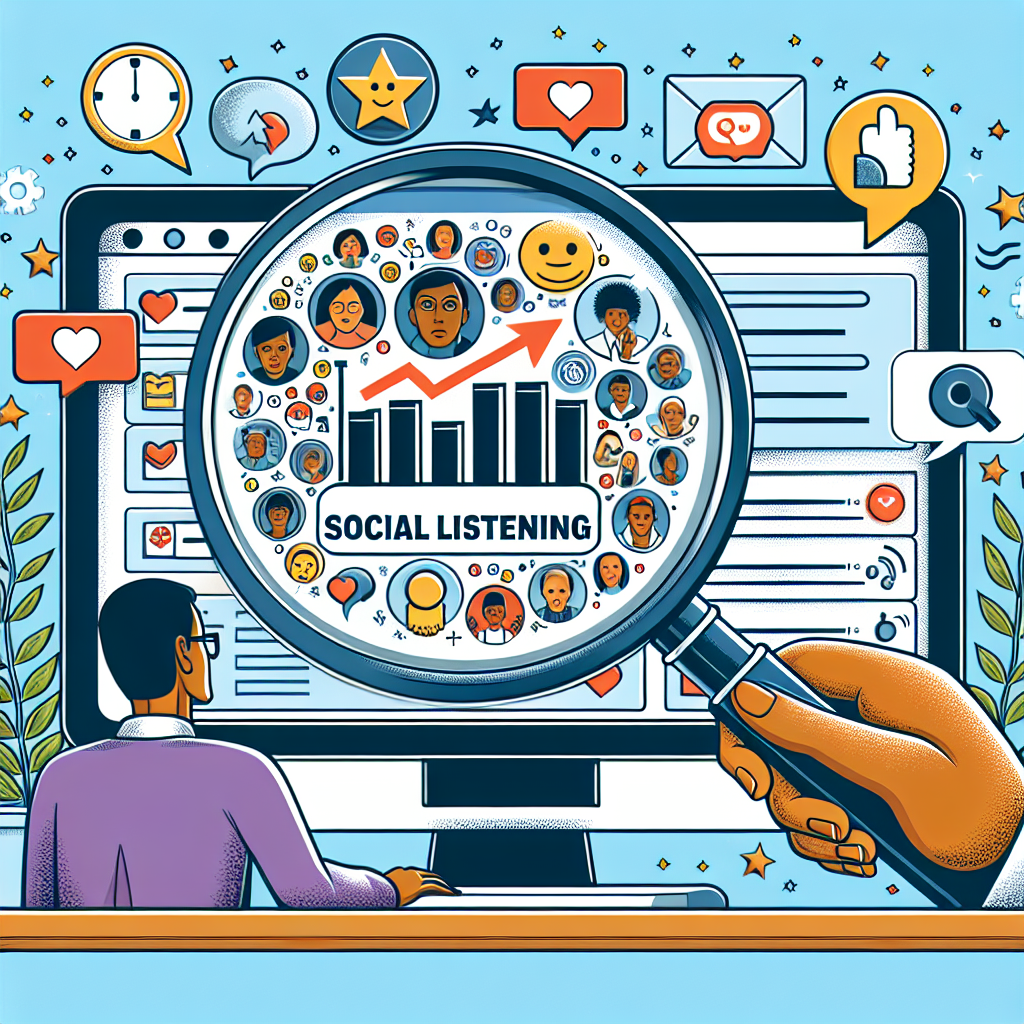In the digital age of social media dominance, customer service has transcended traditional methods to embrace the power of social listening. Social listening entails monitoring online conversations about a brand or product to gain insights and trend analysis. Customer service reviews social listening explores how businesses can leverage this tool to enhance their customer service strategies, optimize customer experiences, and address issues proactively. By tuning into customer chatter, sentiment, and feedback across various social media platforms, companies can better understand their audience’s preferences, needs, and pain points. This in-depth exploration delves into the dynamics of customer service in the era of social listening and its impact on brand perception and loyalty.
Understanding Social Listening for Customer Service Reviews

In the realm of customer service reviews, social listening plays a pivotal role in understanding and addressing customer feedback. It involves monitoring various online platforms such as social media, review websites, forums, and blogs to gain insights into what customers are saying about a brand or product. By analyzing these conversations, businesses can gather valuable information that can help improve their customer service strategies.
Definition of Social Listening
Social listening refers to the process of tracking online conversations about a brand, product, or industry to understand customer sentiment and gather feedback. It goes beyond simply monitoring mentions of a brand’s name and involves analyzing the context and emotions behind these conversations. This allows businesses to identify trends, concerns, and opportunities to enhance their customer service efforts.
Importance of Social Listening in Customer Service Reviews
- Real-time Feedback: Social listening provides businesses with real-time feedback on customer experiences, allowing them to address issues promptly and improve customer satisfaction.
- Identifying Trends: By monitoring social media conversations, businesses can identify emerging trends and topics of interest among their customer base, enabling them to tailor their customer service approach accordingly.
- Competitor Analysis: Social listening also allows businesses to monitor their competitors’ customer service performance and learn from their strengths and weaknesses to gain a competitive edge.
- Building Customer Relationships: Engaging with customers through social listening demonstrates a commitment to customer satisfaction and helps build stronger relationships with the audience.
How Social Listening Tools Work
- Data Collection: Social listening tools gather data from various online sources, including social media platforms, review websites, blogs, and news sites.
- Sentiment Analysis: These tools analyze the sentiment of conversations to determine whether they are positive, negative, or neutral, providing businesses with an overview of customer sentiment towards their brand.
- Keyword Monitoring: Businesses can set up specific keywords, hashtags, or phrases to track relevant conversations and topics related to their brand, allowing them to focus on key areas of interest.
- Reporting and Insights: Social listening tools generate reports and insights based on the data collected, highlighting key trends, customer feedback, and areas for improvement in customer service strategies.
Benefits of Social Listening in Enhancing Customer Service Reviews
Social listening offers a multitude of benefits when it comes to enhancing customer service reviews. By actively monitoring social media platforms and online channels, companies can gain valuable insights that can directly impact their customer service strategies. Some of the key benefits include:
-
Real-time feedback monitoring: Social listening allows businesses to track customer feedback in real-time, enabling them to promptly address any issues or concerns raised by customers. This immediate response can help improve customer satisfaction and loyalty.
-
Identifying customer pain points: Through social listening, companies can identify recurring themes or issues that customers are experiencing. By understanding these pain points, businesses can proactively work towards resolving them, ultimately leading to an enhanced customer service experience.
-
Improving brand reputation: By actively engaging with customers on social media and addressing their feedback, companies can effectively manage their brand reputation. Social listening enables businesses to respond to both positive and negative feedback, showcasing their commitment to customer satisfaction and building trust with their audience.
-
Competitive analysis insights: Social listening also provides valuable insights into competitors’ customer service strategies and performance. By monitoring competitors’ interactions with customers, businesses can gain a competitive advantage by identifying areas where they can differentiate themselves and improve their own customer service practices.

Implementing Social Listening Strategies for Effective Customer Service Reviews
In today’s digital age, implementing social listening strategies is crucial for businesses to effectively manage and optimize customer service reviews. By actively monitoring and engaging with customers on social media platforms, companies can gain valuable insights, address concerns in real-time, and enhance overall customer satisfaction. Here are key steps to successfully implement social listening strategies for effective customer service reviews:
Setting up social listening channels
- Begin by identifying the social media platforms where your target audience is most active, such as Facebook, Twitter, Instagram, and LinkedIn.
- Utilize social listening tools like Hootsuite, Sprout Social, or Mention to monitor brand mentions, comments, and direct messages across all platforms.
- Create alerts and notifications to stay informed about customer feedback and conversations related to your products or services.
Selecting relevant keywords and topics
- Develop a list of relevant keywords and topics related to your brand, industry, products, and competitors.
- Use a combination of broad and specific keywords to capture a wide range of conversations and feedback.
- Monitor industry trends, hashtags, and discussions to stay informed about emerging issues and opportunities for engagement.
Analyzing and interpreting data
- Regularly review social listening data to identify patterns, trends, and sentiment around customer reviews and feedback.
- Utilize sentiment analysis tools to categorize customer comments as positive, negative, or neutral, and prioritize responses accordingly.
- Track key performance indicators (KPIs) such as response time, resolution rate, and customer satisfaction scores to measure the effectiveness of social listening efforts.
Engaging with customers proactively
- Respond promptly to customer inquiries, complaints, and feedback to demonstrate attentiveness and commitment to customer service.
- Personalize responses and address customers by name to show empathy and build rapport.
- Proactively reach out to dissatisfied customers to resolve issues and prevent negative reviews from escalating.
By implementing these social listening strategies, businesses can leverage customer feedback to improve products, services, and overall customer experience. Effective social listening not only enhances customer service reviews but also strengthens brand reputation and loyalty in the digital marketplace.
Case Studies: Successful Integration of Social Listening in Customer Service Reviews
plementing Social Listening Strategies for Effective Customer Service Reviews
Company A: Utilizing social listening to address customer complaints
- Overview: Company A, a leading retail brand, implemented social listening tools to monitor customer feedback on various online platforms.
- Approach: By tracking mentions, comments, and reviews, Company A identified common complaints related to shipping delays and product quality.
- Action: In response to negative feedback, the customer service team promptly engaged with dissatisfied customers, offering solutions and addressing concerns.
- Outcome: This proactive approach not only resolved individual issues but also improved overall customer satisfaction levels and brand loyalty.
- Result: Company A saw a significant decrease in negative reviews and an increase in positive sentiment online, leading to a boost in sales and customer retention rates.
Company B: Leveraging social listening for product improvement
- Overview: Company B, a tech startup, utilized social listening tools to gather insights on customer preferences and opinions about their software products.
- Approach: By analyzing comments and discussions on social media and review platforms, Company B identified recurring feedback about a specific feature lacking in their product.
- Action: Taking this feedback into consideration, the product development team worked on enhancing the feature based on customer suggestions gathered through social listening.
- Outcome: The updated feature received positive reviews and feedback from customers, leading to increased user satisfaction and a competitive edge in the market.

- Result: Company B’s proactive use of social listening not only improved their product offering but also strengthened customer relationships and brand reputation in the industry.
Challenges and Solutions in Social Listening for Customer Service Reviews
Dealing with large volumes of data
Managing the sheer volume of data generated through social listening can be overwhelming for businesses. With millions of conversations happening online daily, it becomes crucial to efficiently sift through this data to extract meaningful insights. One solution to this challenge is leveraging AI and machine learning algorithms to automate the process of data analysis. By setting up specific filters and algorithms, companies can streamline the data collection process and focus on relevant information that impacts customer service reviews.
Handling negative feedback effectively
Negative feedback on social media platforms can quickly escalate and damage a company’s reputation if not addressed promptly and effectively. One way to tackle this challenge is by implementing a robust escalation process that identifies, categorizes, and prioritizes negative feedback based on the severity of the issue. Additionally, having a dedicated team trained in conflict resolution and customer service can help in de-escalating situations and turning negative experiences into positive outcomes for customers.
Ensuring data privacy and security
With the increasing concerns around data privacy and security, businesses engaging in social listening must prioritize safeguarding customer information. One solution to this challenge is implementing strict data protection protocols and compliance measures to ensure that customer data is handled ethically and securely. By obtaining explicit consent from customers before collecting and analyzing their data, businesses can build trust and demonstrate their commitment to protecting customer privacy.
Integrating social listening with existing customer service processes
To derive maximum value from social listening for customer service reviews, companies need to seamlessly integrate this practice with their existing customer service processes. One solution is to implement a centralized customer feedback management system that consolidates data from social media channels, customer service interactions, and other feedback sources. By having a unified view of customer feedback, businesses can identify trends, prioritize issues, and provide timely responses that enhance the overall customer service experience.
Best Practices for Leveraging Social Listening in Customer Service Reviews
- Regularly monitoring social media platforms
To effectively leverage social listening in customer service reviews, it is crucial for companies to regularly monitor various social media platforms where customers are active. This includes platforms like Twitter, Facebook, Instagram, and LinkedIn. By staying attuned to conversations, mentions, and feedback related to the brand, businesses can proactively address customer concerns and feedback in a timely manner.
- Training customer service teams on social listening tools
Another best practice is to provide comprehensive training to customer service teams on utilizing social listening tools effectively. These tools enable teams to track brand mentions, sentiment analysis, and trending topics that can impact customer perceptions. By empowering employees with the right skills and tools, companies can enhance their ability to respond promptly and appropriately to customer feedback on social media.
- Personalizing responses based on social listening insights
One of the key benefits of social listening for customer service reviews is the ability to personalize responses based on insights gathered from online conversations. By analyzing customer sentiment, preferences, and pain points, companies can tailor their responses to address individual needs effectively. This personalized approach not only enhances the customer experience but also fosters stronger relationships and brand loyalty.
- Continuously adapting strategies based on feedback
Lastly, a critical best practice for leveraging social listening in customer service reviews is the need to continuously adapt strategies based on feedback received. By analyzing trends, common issues, and customer feedback patterns, companies can refine their customer service approach to better meet the evolving needs of their target audience. This agile approach ensures that businesses stay responsive and customer-centric in their service delivery.
Future Trends in Social Listening for Customer Service Reviews
In the ever-evolving landscape of customer service reviews, the integration of advanced technologies has become imperative for businesses to stay competitive and meet customer expectations. The following future trends in social listening for customer service reviews are set to revolutionize the way companies interact with their customers:
AI-powered sentiment analysis
Utilizing artificial intelligence algorithms, businesses can now analyze vast amounts of customer data in real-time to gauge sentiment accurately. AI-powered sentiment analysis tools can identify nuances in customer feedback, helping businesses understand the emotional context behind reviews and comments. By leveraging AI, companies can respond promptly to both positive and negative feedback, enhancing customer satisfaction and loyalty.
Integration with CRM systems
The integration of social listening data with Customer Relationship Management (CRM) systems enables businesses to create a unified view of customer interactions across various channels. By merging social media insights with customer profiles, companies can gain a comprehensive understanding of individual preferences, behaviors, and sentiments. This integration allows for personalized and targeted responses to customer reviews, leading to improved overall customer experience.
Enhanced customer journey mapping through social listening data
Social listening data provides valuable insights into the customer journey, allowing businesses to identify touchpoints, pain points, and opportunities for engagement. By analyzing customer interactions on social media platforms, companies can map out the entire customer journey and optimize it for a seamless experience. Understanding the customer journey through social listening data enables businesses to anticipate needs, address concerns proactively, and foster long-term relationships with customers.
Predictive analytics for proactive customer service
By leveraging predictive analytics tools, businesses can forecast customer behavior and preferences based on social listening data. Predictive analytics algorithms analyze historical customer data, social media trends, and external factors to predict future outcomes and trends. This proactive approach enables companies to anticipate customer needs, tailor their services accordingly, and pre-emptively resolve issues before they escalate. Predictive analytics in social listening empowers businesses to deliver proactive customer service, enhancing customer satisfaction and loyalty.
The Role of Social Listening in Shaping the Future of Customer Service Reviews
Social listening is poised to play a pivotal role in shaping the future of customer service reviews by providing businesses with real-time insights into customer sentiments, preferences, and feedback. This proactive approach to monitoring online conversations allows companies to stay ahead of issues, identify trends, and ultimately enhance their customer service strategies.
Impact on customer experience
- Social listening enables businesses to monitor and analyze customer feedback across various social media platforms, review sites, and online forums. By actively listening to what customers are saying, companies can gain valuable insights into their experiences, preferences, and pain points.
- This real-time feedback loop allows businesses to identify and address customer issues promptly, leading to improved customer satisfaction and loyalty. By proactively engaging with customers and resolving their concerns, companies can enhance the overall customer experience.
Evolution of customer service standards
- With the proliferation of social media and online review platforms, customer service standards have evolved to encompass a more customer-centric approach. Social listening plays a crucial role in this evolution by helping businesses understand and adapt to changing customer preferences and expectations.
- By monitoring online conversations and feedback, businesses can identify emerging trends, patterns, and issues that may impact customer satisfaction. This proactive approach allows companies to adjust their customer service strategies in real-time to meet evolving customer needs and preferences.
Opportunities for innovation and growth in the digital era
- Social listening presents businesses with opportunities for innovation and growth in the digital era by providing a wealth of data and insights to inform strategic decision-making. By analyzing customer feedback and sentiment, companies can uncover valuable insights that can drive product innovation, service improvements, and business growth.
- Additionally, social listening enables businesses to track competitor activities, industry trends, and market developments. By staying informed and responsive to external factors, companies can position themselves for success in a rapidly changing digital landscape.
In conclusion, social listening is set to revolutionize customer service reviews by empowering businesses to listen, learn, and adapt in real-time to meet the evolving needs and expectations of their customers. By leveraging social listening tools and technologies, companies can gain a competitive edge, drive innovation, and foster long-term customer relationships in the digital age.
FAQs: Customer Service Reviews Social Listening
What is social listening in terms of customer service reviews?
Social listening refers to the process of monitoring and analyzing online conversations about a brand, product, or service across social media platforms. It involves keeping track of what customers are saying about your company and using this feedback to improve customer service.
How can social listening benefit customer service reviews?
By engaging in social listening, companies can gain valuable insights into customer opinions, preferences, and experiences. This information can help businesses identify areas for improvement in their customer service practices, as well as respond quickly to customer feedback or complaints. Additionally, social listening can help companies track trends and stay ahead of potential issues before they escalate.
What are some tools that can help with social listening for customer service reviews?
There are a variety of social listening tools available that can help companies monitor online conversations about their brand. Some popular tools include Hootsuite, Sprout Social, Brandwatch, and Mention. These tools can help businesses track mentions, analyze sentiment, and measure the impact of their customer service efforts on social media.
How can companies use social listening to improve their customer service reviews?
Companies can use social listening to gather feedback in real-time, respond promptly to customer inquiries or complaints, and proactively engage with customers online. By monitoring social media conversations and feedback, companies can identify common issues or pain points that customers experience and make improvements to their customer service practices accordingly.